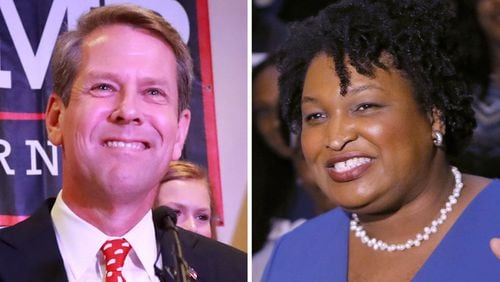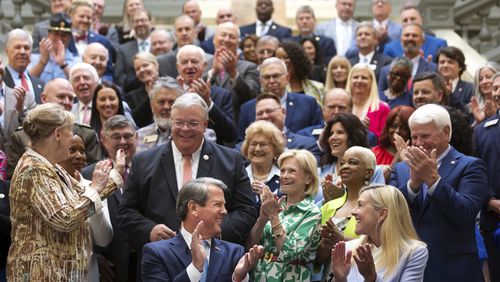Brian Kemp won his first race for public office in 2002 with barbed attacks on an entrenched Democratic incumbent he framed as too out of touch for his Athens-based district.
Stacey Abrams notched her first political victory four years later when she defeated a better-known rival by building a grass-roots base of support — and a robust fundraising network — from the ground up.
The two are now squaring off in the November race for governor, a race with national implications that seems eons removed from their first forays into politics. But those initial runs provide a window into the evolution of their political personas.
With a Republican revolt brewing, Kemp tapped into a well of discontent by presenting himself as a pro-business voice fed up with regulations he pinned on an opponent who underestimated him.
That sharp-elbowed underdog approach suited him well again this year with his rout of Lt. Gov. Casey Cagle, who saw Kemp as a weak runoff opponent. And the partisan attacks that helped him win 16 years ago offered a taste of the barrage he’s unleashed this year.
Abrams, meanwhile, proved in her first campaign she could make up for her lack of name recognition in the district with a deft knack for fundraising and grass-roots outreach.
She exponentially outraised her opponents and then quickly used that cash to fuel a labor-intensive approach to the contest, a strategy that would form the building blocks of her bid for governor.
“In the end, I moved up,” she wrote in “Minority Leader,” her recently released memoir, “without using the same old ladder.”
‘Something to give’
A local developer, Kemp had grown so frustrated with the Athens-Clarke County Commission’s handling of zoning issues that there were murmurs he could run for one of the posts. But he aimed for a bigger prize.
His target was state Sen. Doug Haines, a public interest lawyer who represented a district that stretched from deep-blue Athens to a swath of more conservative rural counties. Democrats still had total control of state politics then, but Kemp felt a realignment was in the works.
Despite warnings to wait another cycle or two, he launched into the campaign with zeal and raised cash from business leaders and longtime friends of his family, which had deep roots in the community.
Kemp’s campaign manager, Jared Thomas, remembers how he juggled his political work with his day job, sometimes signing paperwork while on the backhoe in his work boots.
“Everywhere he went, he’d know people — and meet more people. He’d find out there was a group that met at Hardee’s on Tuesday mornings, and he’d show up,” Thomas said. “I guarantee you the number of people who have his cellphone number is astronomical.”
Haines initially was dismissive of Kemp, seeing him as an “old-money Athens guy” with little understanding of the state Legislature. But then came one biting attack after another. One criticized Haines for his role in redistricting, another for supporting a state budget that limited some teacher pay raises.
“He capitalized on that frustration, and it might have hurt me with some Democrats,” Haines said. “He went negative on me quickly, and I didn’t really hit him back.”
To Kemp's campaign, it was the perfect opening to highlight a contrast in their records. He spent weeks railing against "freebies" in the state budget benefiting embattled Democratic incumbents. But he also called for more funding for the University of Georgia, the district's powerhouse employer.
“To win that district, Brian needed to get 40 percent of the vote in Clarke County,” Thomas said of the Democratic stronghold. “And you don’t do that unless you built a broad coalition. The latest ideological talking points alone won’t do that. He had to work way down deep in the grass roots.”
That November vote wound up being a Republican realignment, with Sonny Perdue winning an upset victory to become the first GOP governor in Georgia since Reconstruction. Kemp defeated Haines by a few hundred votes, a loss that still bothers the Democrat.
“I guess I underestimated him. I never thought he was particularly concerned about policy. I’ve always been a little embarrassed. I didn’t think that much of his potential,” the Democrat said. “Clearly, politically, he’s been quite successful. I should have gotten out in front of those issues.”
Still, Haines didn’t dwell on it that much. His daughter Lauren was born the evening of the vote. She will turn 16 on Election Day.
As for Kemp, he learned a valuable lesson of his own: the advantages of being an underdog.
“Everybody he met with said the race would be difficult,” Thomas said. “They asked him why he didn’t wait until the seat was open.
“He had something to give right then. And if it didn’t work out, he would have woken up the next day and gone back to work. That’s very much the way he’s approaching this race for governor: He felt compelled to get involved.”
‘Potential’
Abrams’ opening came in 2005 when long-serving state Rep. JoAnn McClinton decided not to seek another term in her East Atlanta district. Then a 32-year-old deputy Atlanta city attorney, Abrams sat down with pen and pad to conduct a clear-eyed analysis of herself.
Her work at City Hall and on civic boards, as well as her Yale University law degree, had prepared her well for a legislative role. But she was relatively unknown by local party activists and had few personal relationships with local leaders.
That meant she couldn’t rely on many endorsements to help her in the three-candidate race against George Maddox, a former state legislator, and Dexter Porter, a data analyst and popular political operative.
Instead, she quickly decided her chances for victory hinged on raising far more cash than her rivals.
She soon compiled a list of every potential donor she could muster, and she peppered them with requests for cash. Abrams amassed about $127,000 — about 10 times more than her rivals combined to raise — and she used the staff she hired to help introduce her around the district.
She fast made a name for herself as an up-and-comer. An Atlanta Journal-Constitution op-ed shortly before the primary vote concluded: “Smart and well-educated, Stacey Abrams has potential.”
Her opponents took notice, too. Porter had established himself as a campaign data guru, and he realized he was in trouble. He was lucky to send out one mailer to voters a week, he recalled, while Abrams was launching four or five.
“At one forum, I turned to her and I joked, ‘You know, you’re not doing me right!’ ” he said. “But it never got negative. She never had a bad word to say about me, and I never had a bad word to say about her.”
He and Abrams attended nearly every community event they could, speaking at senior homes and civic associations across the district. Maddox, who would die in 2012, was far less visible as he struggled with health problems.
On Election Day, the only suspense was whether Abrams could avoid a runoff. She did just that, capturing 51 percent of the vote to win the deep-blue district.
“The day after the election, I gave her a call to congratulate her. I told her it was officially a concession, but I didn’t really need to since she beat me so badly,” Porter said. “She bust out laughing.”
He has a coda to the story. Not long after, he got a call from Barack Obama's evolving presidential campaign. He was hired to be the Illinois Democrat's Georgia political director — and one of the first calls he made was to Abrams.
OUR REPORTING
It's a busy election year, and The Atlanta Journal-Constitution is keeping the spotlight on the leading candidates for governor, Republican Brian Kemp and Democrat Stacey Abrams. Recent AJC stories have examined Kemp's finances and Abrams' position while in the state Legislature as a leading collector of per diem. Look for more at ajc.com/politics as the state heads for the general election on Nov. 6.
About the Author








